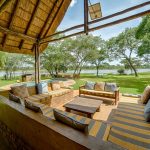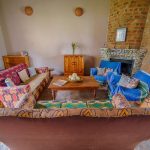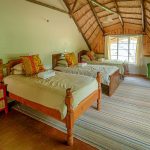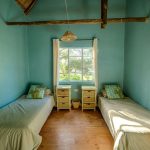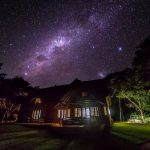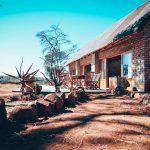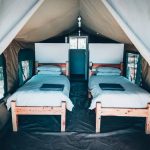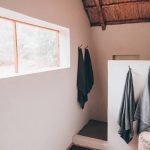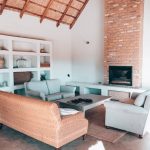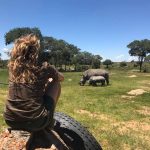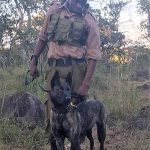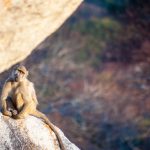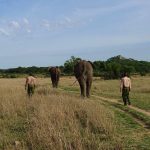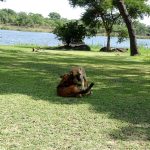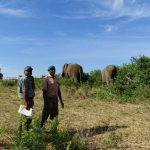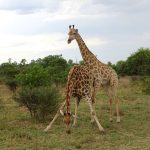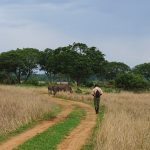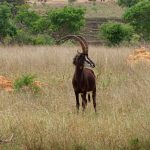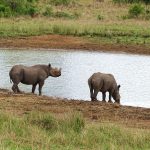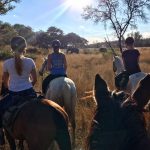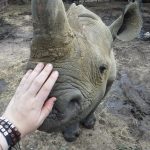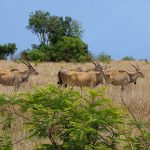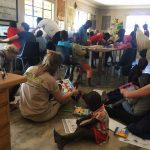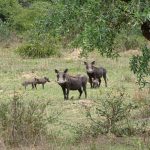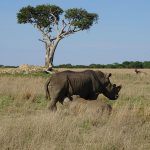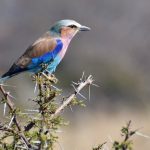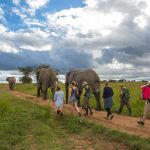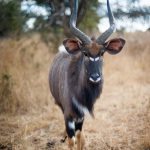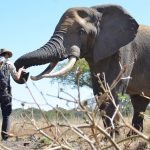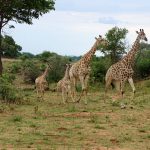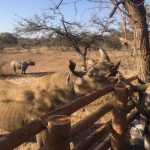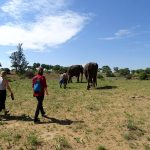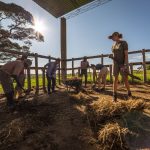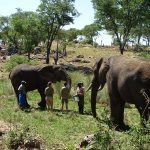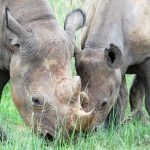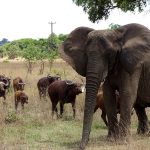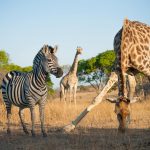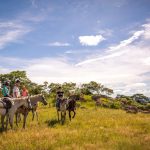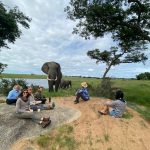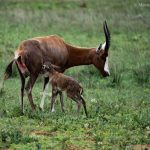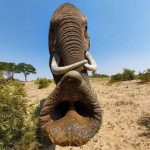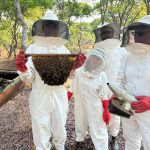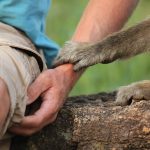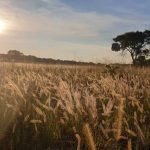Elephant & Rhino Project
The Elephant & Rhino Project is located about 2h from Harare, in a 10 000 hectares game reserve. It provides a hands-on experience with the elephants and an up-close approach with the rhinos. A release programme for black rhinos has started, with the aim of releasing these endangered animals in the Zambezi valley eventually.
The project firmly believes that the key to sustainable conservation practices is collaboration with local communities.
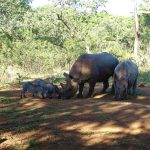
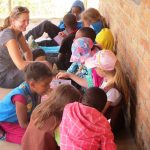
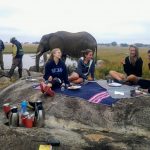
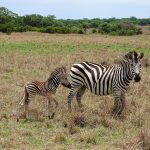
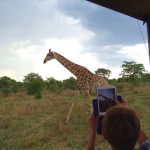
Arrival
Arrivals are scheduled on Thursdays, at Harare’s international airport, at 15h at the latest. A team member will wait for you to drive you and the other volunteers to the game reserve. Departures are also scheduled on Thursdays, at 7h from the project.
The project offers a once in a lifetime opportunity to work hands-on with incredible wildlife, and side by side with conservation experts and local communities. A dozen of different antelope species live on the game reserve, as well as zebras, girafes and a multitude of birds and reptiles.
The rhinos : the main objective of the project is to breed black rhinos, a critically endangered species, only for reintroduction purpose. There are currently 5 of them (with two babies) and 3 white rhinos. An anti-poaching unit remains with them 24h/7 since the poaching incident that happened in 2007.
This programmes allows the volunteers to be up close with the animals while working towards their conservation. The following activities may be offered :
- Walk with the rhinos
- Behavior observations
- Meeting with the anti-poaching unit and experience their training
The elephants : the project is home to 3 elephants that have been saved many years ago when they were orphans by the founder of the game reserve. The oldest one is a female, happily living with a herd of buffalos (!). The other two, a male and a female, are very habituated to humans and the volunteers and handlers can interact with them. Right now, the fences are not electrified so it is necessary to walk with them during the day and have them sleep in secure bomas at night so that they don’t walk out of the park. Because they are extremely sensitive and intelligent animals and because their environment is not as rich as it would be if they belonged to an elephant herd in the wild, the handlers do daily teaching sessions to give them extra stimulation so that they don’t get bored. The physical and psychological well-being of all the animals is reviewed constantly in conjunction with external animal welfare experts and highly renowned wildlife veterinarians.
The volunteers may be involved in the different activities :
- Feed and walk with the elephants and their handlers
- Monitor their movements and behaviour
- Clean out their bomas
Local communities : the Elephant & Rhino Project believes that sustainable conservation cannot exist without community support. As a result, it has been a long-time employer of local community members, a strong supporter of local primary and secondary education, and an active participant in grassroots development projects. It supports community projects and initiatives which provide either education, medical or financial empowerment opportunities.
Volunteers may help with this (note: no school during school holidays) :
- Educate local school-children about conservation, wildlife and the environment
- Help out with gardening and renovations
- Help with the bee hives
- Assist with English lessons
- Cultural evenings
Here is a list of activities that you may take part in during your stay (please note that this is for your information and that you may or may not take part in all the activities listed below):
- Game counts by foot, vehicule or on horseback
- Vegetation control
- Fences or road maintenance
- Horseriding
- Group cohesion activities
- Learn how to track an animal
A typical daily schedule (please note that this schedule may vary according to the season and activities undertaken.):
6h15 – 9h : 1st activity
9h – 10h : breakfast
10h – 12h30 : 2nd activity
12h30 – 14h : lunch
14h – 17h : 3rd activity
18h : dinner
Days off
Saturday afternoon and Sundays are at leisure, you can stay at the camp to relax or spend the weekend in Harare or Victoria Falls.
Horse riding
For experienced riders, an equine volunteer project option is offered. You will contribute to conservancy management from horseback in the mornings, along with Judy, the matriarch of the park, and will join with the volunteer group in the afternoons. Riding allows you to be even closer to the animals as they are not afraid of horses.
There are two options available :
– You can either be accommodated in a comfortable farm style thatched house in the heart of the conservancy designed for 12 volunteers. Situated on the peaceful shores of a large dam, the view is quite unique. The house consists of five large and welcoming bedrooms with a variety of different bedding arrangements to suit your individual requirements and has 2 inside bathrooms and 3 outside.
Three home-style meals will be prepared for you and the laundry can be done at least once a week.
Wifi available for $10 per week.
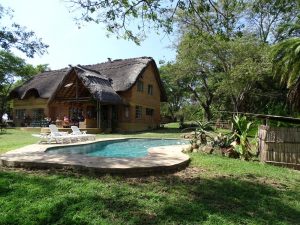
– there is also a tented camp on the other side of the lake, with 6 twin rooms, each with ensuite bathroom. There is a fully equipped kitchen and lounge area and the services provided are the same as for the first option.
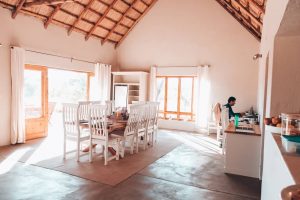
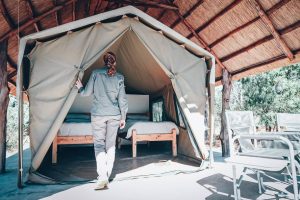
Period Programme fees in dollars ($) 2024
1 week $ 950
2 weeks $ 1900
3 weeks $ 2850
4 weeks $ 3800
6 weeks $ 5700
8 weeks $ 7600
Horse riding Project
1 week horse riding : $ 1305
2 weeks horse riding : $ 2610
1 week horse riding / 1 week Elephant & Rhino Project : $ 2205
1 week horse riding / 2 weeks Elephant & Rhino Project : $ 3105
2 weeks horse riding / 1 week Elephant & Rhino Project : $ 3510
2 weeks horse riding / 2 weeks Elephant & Rhino Project : $ 4410
Are included in the Programme Fees: the registration fees, airport transfers, accommodation, three meals a day, laundry, your supervision.
“One thing I think is wonderful, and that you can do at the Elephant & Rhino Project, is to come close up to an African elephant. To feel their rough skin, to hear their rumbeling from their stomach, to experience how big they are and see them playing around in the water or with a branch … that is to really live”. Anna
“How was my time at the Elephant & Rhino Project ? Where to start ? I have been able to meet and to work with some of the most beautiful creatures that roam this planet whilst volunteering here. The staff are all so passionate about their work and it’s been a privilege to learn from them about wildlife in Africa. I’ve felt part of a family and will treasure the wonderful memories I have made. This project is making a true difference to the conservation of the black rhino and it’s been a pleasure to play a part in that.” Millie
“This is the place to come if you want a full view of Africa – from animals, to the staff, to the local communities and to the beautiful landscapes. It will change the wy you view your life and you will taste the joy and freedom like never before.” Sofia-Ana
“If you are joining the equine programme, you can look forward to some amazing rides on some great horses, breathtaking scenery, wonderful close-up encounters with all of the animals, fun cattle drives, and last but not least, the company of Judy. A lady who’s personality, passion, knowledge and stories will leave you with a feeling of amazement and admiration once you leave.” Malene



